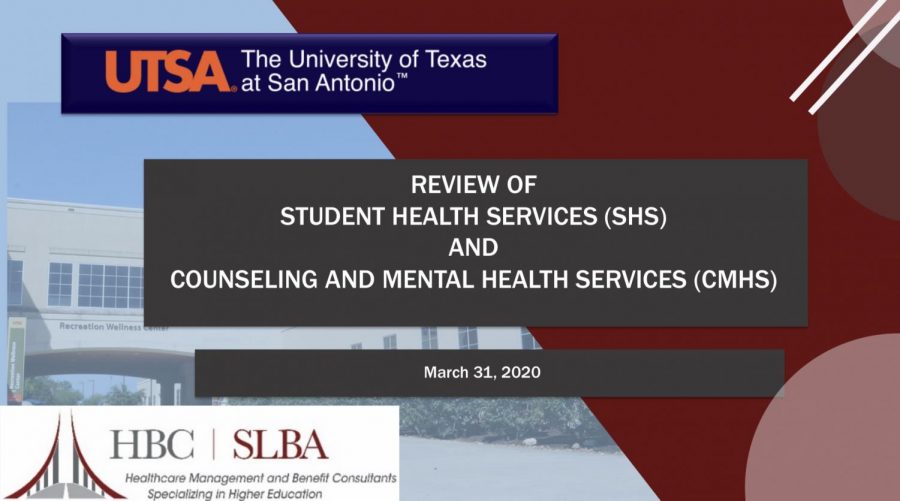University makes changes to counseling and mental health services, student health services following external recommendations
April 27, 2020
Provost and Senior Vice President for Academic Affairs Kimberly Espy sent an email to the UTSA community on April 14 with an update on the President’s Initiative on Enriching Campus Wellbeing. The email included a report from Hodgkins Beckley Consulting (HBC) on UTSA’s Counseling and Mental Health Services (CMHS) and Student Health Services (SHS).
In their report, HBC compared UTSA’s services to those of nine other peer institutions: California State University at Sacramento, Colorado State University, Florida International University, George Mason University, Georgia State University (Atlanta Campus), Old Dominion University, Portland State University, University of California at Irvine and University of Central Florida.
HBC found that fewer UTSA students use SHS than the national peer average — 10% versus 32% — UTSA’s SHS fee is lower than the peer average, and SHS has a “scope of care limited for chronic conditions and mental health.”
Recommendations provided by HBC for CMHS and SHS include improving the “connection and alignment” between CMHS and SHS to provide integrated care under the president’s well-being initiative, reviewing “CMHS and SHS for cultural competency and sensitivity,” improving communication and marketing for both CMHS and SHS, and evaluating telemedicine services and “resource sharing/partnership opportunities” with UT Health San Antonio.
HBC recommended that UTSA enhance the capacity of CMHS by increasing CMHS professional and support staff, increasing walk-in hours and eliminating the provision of “nonessential services that can be performed by others.”
HBC also recommended that SHS improve access to care by eliminating the $10 copayment and Well Women Visit Fee, increasing SHS’s capability to treat depression, increasing capability to treat chronic conditions and improving communication regarding the availability and range of services that SHS provides.
According to Espy’s email, the university is responding to HBC’s recommendations by extending CMHS’s walk-in hours to four days a week; phasing out the scheduling by conducting initial CMHS evaluations via phone; hiring more full-time CMHS counselors; moving ADHD and other disability evaluations to the UTSA Psychological Assessment and Consultation Center; expanding SHS’s scope of service through medical screening, medicine, management and monitoring to better treat anxiety, depression and other common “behavioral complaints”; and eliminating the $10 SHS copayment.
Espy also said the university is going to “develop a communications and marketing plan that not only reaches students, but also engages families and faculty/staff” to increase the community’s awareness of these changes and services.
“It had been our hope to have all these changes fully implemented by the end of the Spring 2020 semester,” Espy said in her email. “Because UTSA has restricted campus operations in response to the coronavirus pandemic, staff in SHS and CMHS will continue working on these recommendations, so that they can be implemented shortly after the university resumes normal operations.”









